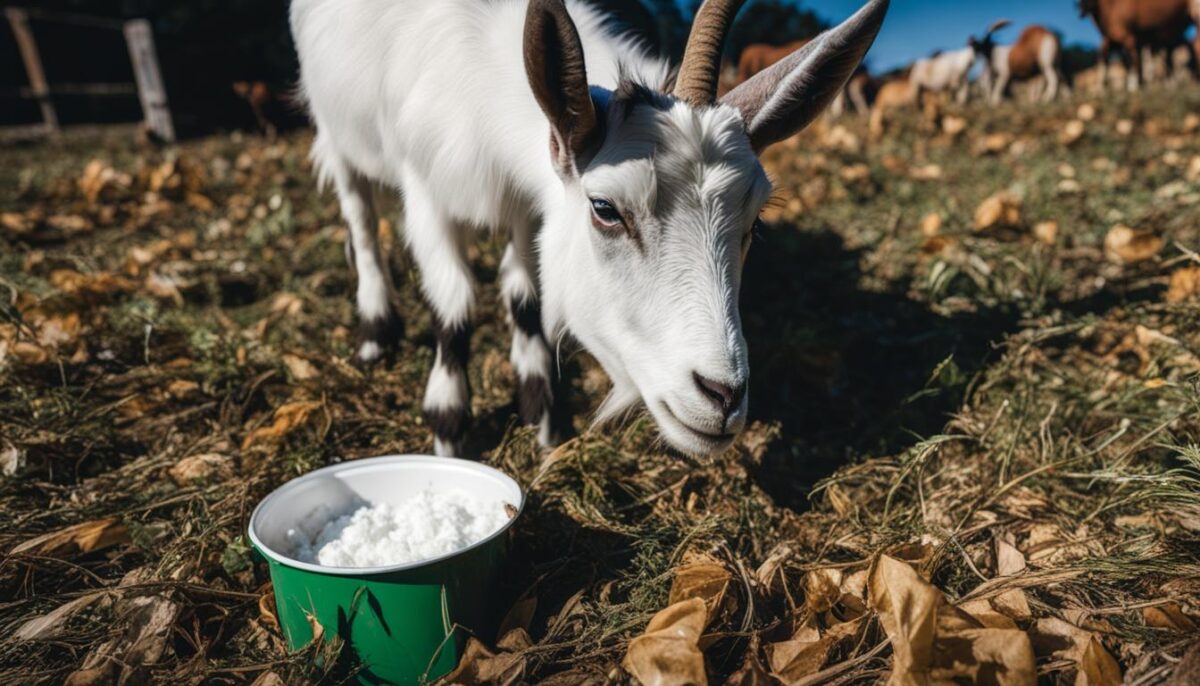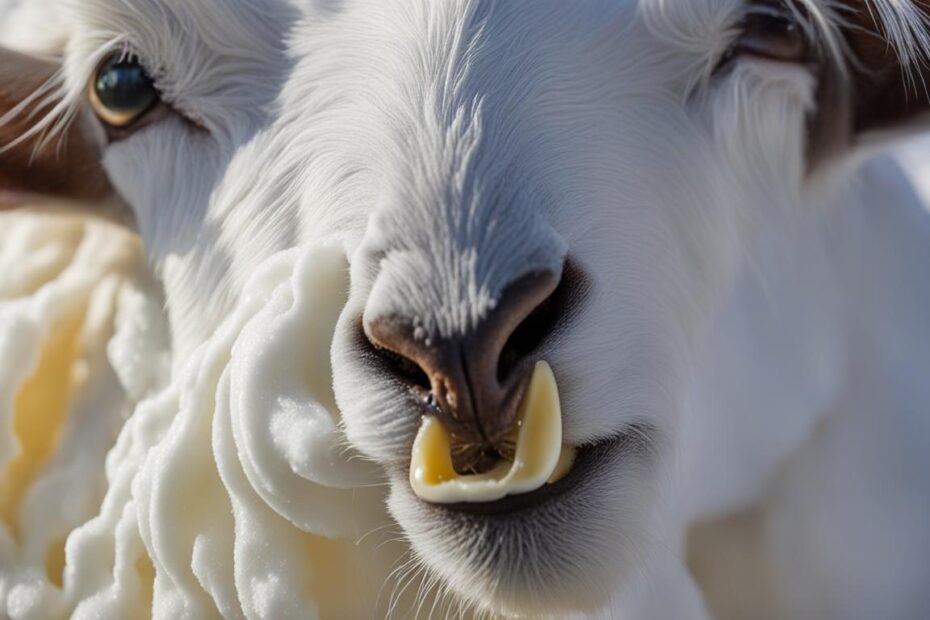Goat Foaming at the Mouth – Foaming at the mouth in goats can be a cause for concern, and it is important to understand the underlying causes. The most common cause is frothy bloat, which is often caused by overeating lush, damp feeds such as clover or alfalfa. Bloat can be dangerous and even deadly for goats if not treated promptly.
Key Takeaways:
- Foaming at the mouth in goats is often caused by frothy bloat, which occurs due to overeating lush, damp feeds.
- Other potential causes include organophosphate poisoning, excessive salivation, and dental issues.
- Accompanying symptoms may include bloating, difficulty breathing, and changes in rumen motility.
- Consult a veterinarian for proper diagnosis and treatment of foaming at the mouth in goats.
- Prevention measures include monitoring diet, dental health, and regular veterinary check-ups.
Common Causes of Goat Foaming at the Mouth
When a goat is foaming at the mouth, it can be alarming for goat owners. Understanding the underlying causes is crucial in order to address the issue effectively. The most common cause of foaming at the mouth in goats is frothy bloat, which occurs when the rumen expands with foam due to overeating. This is particularly common when goats consume lush, leguminous feeds such as clover or alfalfa. Bloat can be dangerous and even deadly for goats if not treated promptly.
Another potential cause of foaming at the mouth in goats is organophosphate poisoning. Organophosphates are chemicals commonly found in certain pesticides, and if goats come into contact with these substances, it can lead to excessive salivation and foaming. Additionally, dental issues such as uneven or overgrown teeth can also contribute to foaming at the mouth in goats. It is important to consult a veterinarian for a proper diagnosis and treatment plan to address these underlying causes.
Here is a table summarizing the common causes of foaming at the mouth in goats:
| Cause | Description |
|---|---|
| Frothy Bloat | Expansion of rumen with foam due to overeating lush, leguminous feeds |
| Organophosphate Poisoning | Poisoning from exposure to chemicals in certain pesticides |
| Dental Issues | Uneven or overgrown teeth leading to difficulty in chewing and swallowing |
It is important to note that foaming at the mouth in goats can be a symptom of various underlying health issues, and proper veterinary care is essential. A veterinarian will be able to conduct a physical examination and perform diagnostic tests to determine the exact cause of the foaming and develop an appropriate treatment plan. Timely diagnosis and treatment are crucial to prevent complications and ensure the well-being of the goat.
Understanding Frothy Bloat in Goats
Frothy bloat is a condition that can occur in goats where the rumen, which is the largest compartment of their stomach, becomes filled with froth. This froth is caused by the fermentation of ingested feeds, particularly lush, leguminous ones like alfalfa or clover. It is important to understand this condition as it can lead to respiratory or circulatory failure if left untreated.
The froth in the rumen creates pressure on the diaphragm, making it difficult for the goat to breathe. This can result in symptoms such as foaming at the mouth and dyspnea, which is difficulty breathing. Additionally, the pressure from the froth can cause the abdomen to distend and lead to discomfort for the goat.
In order to address frothy bloat in goats, it is important to consult a veterinarian for a proper diagnosis and treatment plan. The veterinarian may administer antifoaming agents to reduce the froth in the rumen and relieve the pressure on the diaphragm. They may also recommend removing the source of the bloat-inducing feed and providing supportive care to help the goat recover.
| Symptoms of Frothy Bloat in Goats | Treatment of Frothy Bloat in Goats |
|---|---|
|
|
“Frothy bloat is a serious condition in goats that requires prompt veterinary care. It is important to monitor their diet, especially when feeding them leguminous feeds, to prevent overeating and the subsequent development of frothy bloat.” – Dr. Jane Smith, Veterinarian
Other Causes of Foaming at the Mouth in Goats
While frothy bloat is the most common cause of foaming at the mouth in goats, there are other factors that can contribute to this symptom. It is essential to consider these potential causes and seek proper veterinary care to ensure the health and well-being of your goats.
Poisoning in Goats
Organophosphate poisoning is one potential cause of foaming at the mouth in goats. This can occur when goats are exposed to pesticides or other toxic substances containing organophosphates. Muscle tremors, seizures, excessive salivation, and foaming at the mouth can be observed as symptoms. If poisoning is suspected, immediate veterinary attention is necessary to prevent further complications.
Excessive Salivation
Excessive salivation in goats can also lead to foaming at the mouth. This can be caused by various factors such as ingestion of irritants, toxins, or plants that stimulate saliva production. If goats are exhibiting excessive salivation accompanied by foaming at the mouth, it is important to consult a veterinarian to identify the underlying cause and provide appropriate treatment.
Uneven Teeth
Dental issues, such as uneven or overgrown teeth, can contribute to foaming at the mouth in goats. When the teeth are not properly aligned or have overgrown, it can affect the goat’s ability to chew and swallow food properly. This can result in excessive salivation and foaming at the mouth. Regular dental check-ups and proper dental care are crucial to prevent and address such issues.
Understanding the different causes of foaming at the mouth in goats is essential for proper diagnosis and treatment. Whether it is frothy bloat, poisoning, excessive salivation, or dental issues, consulting a veterinarian is necessary to determine the underlying cause and provide effective care. By addressing these causes promptly, you can help ensure the health and well-being of your goats.

Symptoms of Foaming at the Mouth in Goats
When a goat is foaming at the mouth, it can indicate an underlying health issue that requires attention. In addition to the foam around the mouth, there are several other symptoms that may accompany this condition. Recognizing these symptoms is crucial in order to seek appropriate veterinary care and address the underlying cause.
Some common symptoms that may be observed in goats with foaming at the mouth include:
- Bloating
- Abdominal distention
- Dyspnea (difficulty breathing)
- Grunting
- Mouth breathing
- Protrusion of the tongue
- Frequent urination
- Changes in rumen motility
If any of these symptoms are present along with foaming at the mouth, it is important to seek veterinary care as soon as possible. These symptoms can indicate serious health issues such as frothy bloat or organophosphate poisoning, which require prompt diagnosis and treatment.
| Symptoms | Possible Causes |
|---|---|
| Foaming at the mouth | Frothy bloat, organophosphate poisoning, dental issues |
| Bloating | Frothy bloat |
| Abdominal distention | Frothy bloat |
| Dyspnea (difficulty breathing) | Frothy bloat |
| Grunting | Frothy bloat |
| Mouth breathing | Frothy bloat |
| Protrusion of the tongue | Frothy bloat |
| Frequent urination | Frothy bloat |
| Changes in rumen motility | Frothy bloat |
“Foaming at the mouth in goats can be a concerning symptom that should not be ignored. It is important to pay attention to other accompanying symptoms and seek veterinary care for proper diagnosis and treatment.”
Diagnosis and Treatment of Foaming at the Mouth in Goats
To properly diagnose and treat foaming at the mouth in goats, it is essential to consult a veterinarian who specializes in goat care. The veterinarian will conduct a thorough physical examination of the goat and may also perform diagnostic tests to determine the underlying cause of the condition. These tests may include bloodwork, rumen fluid analysis, and imaging studies such as ultrasound.
The treatment for foaming at the mouth in goats will depend on the specific cause identified by the veterinarian. If the cause is frothy bloat, antifoaming agents may be administered to reduce the foaming in the rumen and relieve pressure on the diaphragm. Additionally, the goat may need to have access to fresh water and be fed a more appropriate diet to prevent further episodes of bloat.
In cases where foaming at the mouth is caused by organophosphate poisoning, the veterinarian may administer specific antidotes and provide supportive care to manage symptoms. Dental issues that contribute to foaming at the mouth may require treatment such as filing down uneven teeth or extracting damaged teeth.
| Treatment Options for Foaming at the Mouth in Goats | Description |
|---|---|
| Antifoaming Agents | Administered to reduce the foaming in the rumen and relieve pressure on the diaphragm. |
| Removal of Bloat-Inducing Feed | The goat’s diet may need to be adjusted to prevent further episodes of frothy bloat. |
| Specific Antidotes | Used in cases of organophosphate poisoning to counteract the effects of the poison. |
| Dental Treatment | Addressing dental issues such as uneven or overgrown teeth through filing or extraction. |
It is important to follow the veterinarian’s instructions regarding medication dosage, frequency, and duration of treatment. Regular follow-up visits may be necessary to monitor the goat’s progress and adjust the treatment plan if needed. With proper diagnosis and treatment, goats experiencing foaming at the mouth can recover and regain their health.
Prevention of Foaming at the Mouth in Goats
Preventing foaming at the mouth in goats is essential for maintaining their overall health and well-being. By implementing proper management practices, you can reduce the likelihood of this concerning symptom and ensure the optimal health of your goats.
Diet Monitoring
One of the key preventive measures is monitoring your goats’ diet. Avoid overfeeding them with lush, leguminous feeds such as alfalfa or clover, as these can contribute to frothy bloat and foaming at the mouth. Provide a balanced diet with appropriate amounts of roughage and forage to keep their rumen function healthy.
Maintaining Dental Health
Regular dental care is crucial in preventing foaming at the mouth in goats. Ensure their teeth are properly aligned, not overgrown, or uneven, as these dental issues can lead to excessive salivation and contribute to the foaming symptom. Schedule regular dental check-ups with a veterinarian to address any dental concerns promptly.
Access to Clean Water
Goats should always have access to clean and fresh water. Dehydration can increase the risk of various health issues, including frothy bloat. Ensure their water sources are clean and regularly monitored to promote hydration and prevent digestive problems.
Prompt Veterinary Care
Early detection and treatment of any signs of illness or poisoning are vital in preventing foaming at the mouth in goats. Regular veterinary check-ups allow for prompt identification of potential health issues, ensuring appropriate interventions are implemented in a timely manner.
| Preventive Measures | Benefits |
|---|---|
| Diet Monitoring | Reduces the risk of overeating and frothy bloat |
| Maintaining Dental Health | Prevents dental issues that can contribute to foaming at the mouth |
| Access to Clean Water | Promotes hydration and prevents digestive problems |
| Prompt Veterinary Care | Allows for early detection and treatment of potential health issues |
By implementing these preventive measures, you can significantly reduce the occurrence of foaming at the mouth in goats and ensure their overall well-being. Remember, maintaining a healthy and balanced environment for your goats is essential for their optimal health and happiness.
Importance of Veterinary Care for Foaming at the Mouth in Goats
When a goat is foaming at the mouth, it is crucial to seek professional veterinary care promptly. Foaming at the mouth can be a symptom of various underlying health issues, such as frothy bloat or organophosphate poisoning. Without proper diagnosis and treatment, these conditions can lead to respiratory or circulatory failure, posing serious risks to the goat’s health and well-being.
A veterinarian will play a vital role in determining the cause of foaming at the mouth and guiding the appropriate treatment plan. They will conduct a physical examination and may perform diagnostic tests to accurately diagnose the underlying issue. Based on their findings, the veterinarian may administer antifoaming agents, remove bloat-inducing feed sources, and provide supportive care to alleviate the symptoms.
Veterinarians have the expertise and knowledge to address any other underlying health issues that may contribute to foaming at the mouth in goats. They can provide tailored treatments and medications to address dental issues, excessive salivation, or other potential causes. Regular follow-up visits with a veterinarian are essential to monitor the goat’s progress and adjust the treatment plan as needed.
By seeking veterinary care for goats experiencing foaming at the mouth, goat owners can ensure the best possible outcome for their animals. Veterinary professionals can provide the necessary guidance, expertise, and treatments to mitigate the risks and dangers associated with this symptom. Timely intervention and ongoing veterinary care play a crucial role in supporting the recovery and overall health of goats affected by foaming at the mouth.
Understanding the Risks and Dangers of Foaming at the Mouth in Goats

Conclusion
Foaming at the mouth in goats can be a concerning symptom that may indicate various underlying health issues. The most common cause is frothy bloat, which occurs when goats overeat lush, damp feeds like clover or alfalfa. Prompt veterinary care and proper diagnosis are essential to determine the exact cause and provide effective treatment.
Prevention is key to maintaining the overall health and well-being of goats. Monitoring their diet to prevent overeating of leguminous feeds, ensuring access to clean water, and addressing dental issues are important preventive measures. Regular veterinary check-ups can help identify and address potential health issues early on.
Supporting the recovery of goats with foaming at the mouth involves providing them with appropriate care, such as adjusting their diet, administering prescribed medications, and creating a stress-free environment. Regular follow-up visits with a veterinarian are crucial to monitor their progress and make any necessary adjustments to the treatment plan.
By taking proactive steps to prevent and address foaming at the mouth in goats, we can safeguard their health and ensure their well-being. By working closely with a veterinarian, goat owners can effectively manage this symptom and promote the overall health and vitality of their beloved goats.
FAQ
Why is my goat foaming at the mouth?
Foaming at the mouth in goats can be caused by various factors, including frothy bloat, organophosphate poisoning, excessive salivation, and dental issues.
What is frothy bloat and how does it cause foaming at the mouth in goats?
Frothy bloat is a condition where the rumen becomes filled with foam, causing pressure on the diaphragm and making it difficult for the goat to breathe. This can lead to foaming at the mouth and other symptoms.
What are the other causes of foaming at the mouth in goats?
Other causes can include organophosphate poisoning, excessive salivation due to toxins or irritants, and dental issues such as uneven or overgrown teeth.
What are the symptoms of foaming at the mouth in goats?
Symptoms can include foaming at the mouth, bloating, distention of the abdomen, difficulty breathing, grunting, mouth breathing, protrusion of the tongue, frequent urination, and changes in rumen motility.
How is foaming at the mouth in goats diagnosed and treated?
A veterinarian will conduct a physical examination and may perform diagnostic tests to determine the underlying cause. Treatment will depend on the cause but may involve administering antifoaming agents, removing bloat-inducing feed, and addressing other health issues.
How can foaming at the mouth in goats be prevented?
Preventive measures include monitoring diet to prevent overeating, maintaining dental health, providing clean water, addressing signs of illness or poisoning promptly, and regular veterinary check-ups.
Why is veterinary care important for goats foaming at the mouth?
Veterinary care is necessary to provide a proper diagnosis, determine the underlying cause, and administer appropriate treatment to prevent complications and ensure the well-being of the goat.
What are the risks and dangers of foaming at the mouth in goats?
Foaming at the mouth can indicate serious health issues that can lead to respiratory or circulatory failure and even death if left untreated.
How can the recovery of goats with foaming at the mouth be supported?
Providing appropriate care and support, adjusting diet, administering prescribed medications, monitoring symptoms, and maintaining a stress-free environment can aid in the recovery process.
What is the importance of understanding foaming at the mouth in goats?
Understanding the causes, symptoms, and treatment of foaming at the mouth in goats is crucial for goat owners to ensure the overall health and well-being of their animals.


